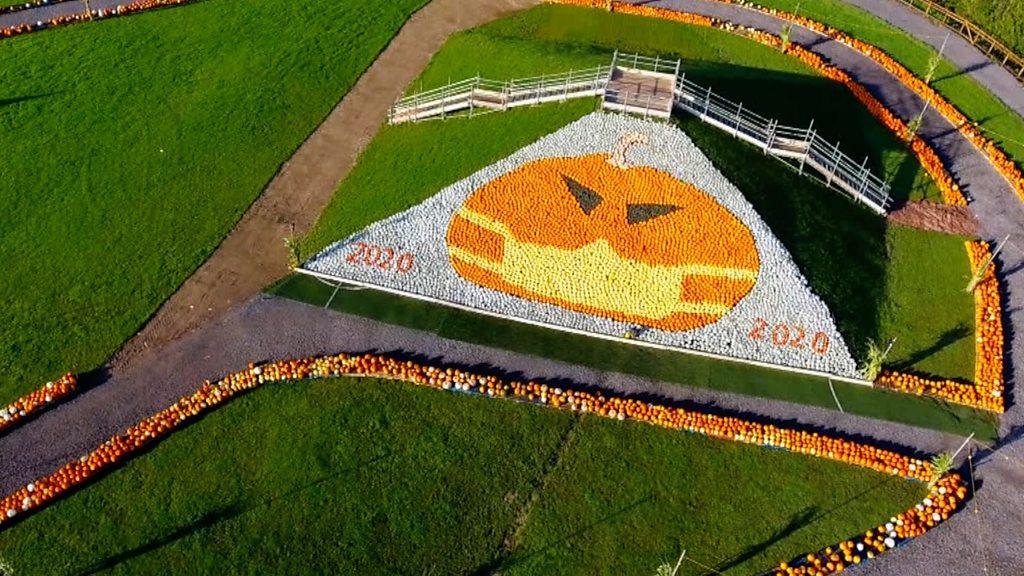Halloween firms face up to a pandemic fright
- Published
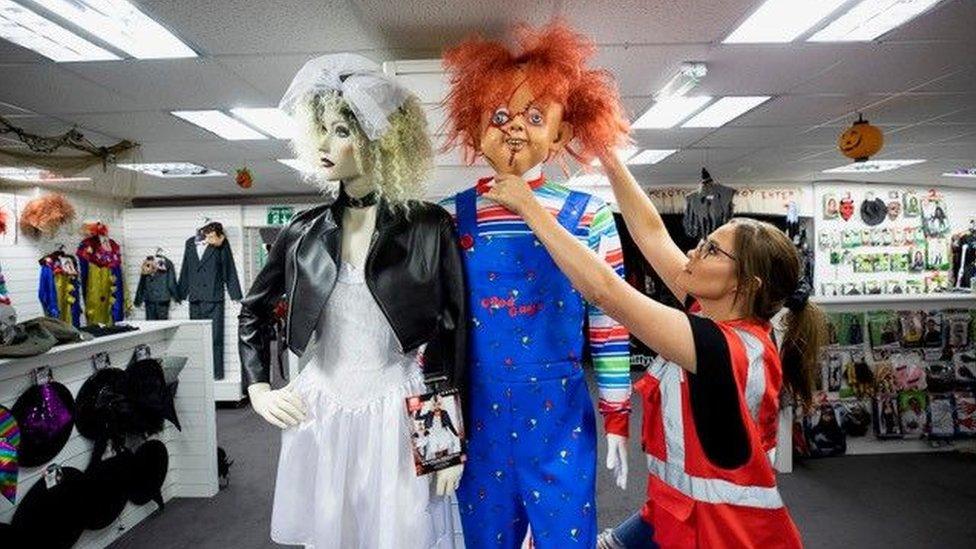
Smiffys has outlets across the UK
For UK fancy-dress costume business Smiffys, which ships 26 million items every year, Halloween is one of their busiest seasons.
But, as to be expected, Halloween 2020 is going to look a lot different from any other it has faced. They knew they had to adapt.
"We always planned for the likelihood that the coronavirus would be around for October, and indeed the whole of this year," says Dominique Peckett, director of Smiffys.
There are different regulations in place in England, Scotland, Wales and Northern Ireland, about what is allowed or prohibited this year.
In the past weeks, Smiffys has been promoting a key message to its retail partners and consumers: Bring the Party Home.
Hampshire farm opens Covid-safe pick your own pumpkin
Coronavirus and Halloween: Can you go trick or treating?
Ms Peckett adds: "[We want] people to get into the mindset that Halloween and other events are not cancelled; they just must be celebrated and embraced in a slightly different way this year."
Smiffys is on track to achieve 70% of 2019's Halloween sales, but it should be noted most of their Halloween sales are pre-sold to retailers and delivered before the event.
Bittersweet
From sweets distributors to fancy-dress shops to massive parades, several sectors have had to respond and adapt to a chilly, pandemic-stricken, Halloween season.
The first thing to know from an industry perspective is that Halloween isn't just 31 October, but a season.
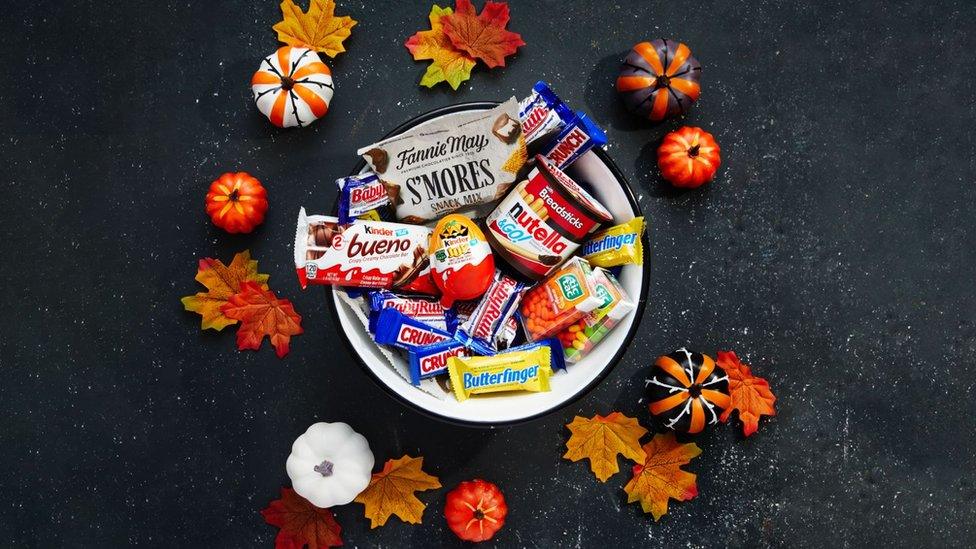
Halloween confectionery made by Ferrero USA
In fact, sweets makers such as Mondelez International (owner of Cadbury and Maynards) and Ferrero USA (Butterfinger, Baby Ruth, Crunch) placed orders in January and February 2020 to get products in by late spring.
It has been hard to gauge what sales will look like in the run up to Halloween, a Mondelez UK spokesperson says, but Ferrero USA is seeing an increase in sales this year.
From 4 September to 4 October, the chocolates category is up 6.8% compared with the same time last year.

Phil DeConto says Ferrero USA is using more online promotion
"I believe parents are seeking a sense of normalcy for themselves and their children," says Phil DeConto, vice-president of category management and shopper insights at Ferrero USA.
He also says their e-commerce sales exploded during the pandemic, encouraging them to upgrade online advertising alongside their usual in-store promotions.
The sweets business booms during the Halloween season. In the US, this season annually accounts for approximately $4.6bn (£3.5bn) in sales in the eight weeks before Halloween according to the National Confectioners Association.
For Canada, that figure hit $550m Canadian dollars (£315m) in 2017. And in the UK, the Halloween season is worth £427m, which includes sweets, pumpkins and baked goods, according to industry reports.
But UK retailers might not know the health of their sweets sales until after 31 October.
"We do not expect trick or treating to take place in parts of the country affected by more stringent lockdowns," notes Andrew Goodacre, boss of the British Independent Retailers Association (Bira).
"The problem for retailers is that Halloween stock is often ordered well in advance of the actual date so many could be left with unsold stock."
He adds that the UK saw only around 80% of independent retailers in general, and not just sweets shops, re-open after the initial lockdowns were lifted, which may help with online sales but could hurt walk-in traffic.
Family advice
At Smiffys, Ms Peckett is optimistic their fancy-dress sales won't be hurt too badly by the pandemic.
"There appears to be so much pent-up demand for people to celebrate an event this year after virtually every festival, hen and stag party, and sporting event, has been cancelled since the end of March," she says.
In the US, Halloween spending is expected to drop by 8% to $8.05bn, with costume sales accounting for much of the decline, according to the National Retail Federation.
Playing a role is guidance from federal and state-level officials on how to celebrate Halloween this year.
The US Centers for Disease Control and Prevention has advised families to restrict contact between trick-or-treaters, and suggested households set up a bowl of wrapped candies on their doorstep.
Also, regions such as Los Angeles County and El Paso County have banned Halloween parties and haunted house attractions.
Courtland Hickey, general manager of 40-year-old Chicago Costume, expects his store to take 30% of their usual sales this year.
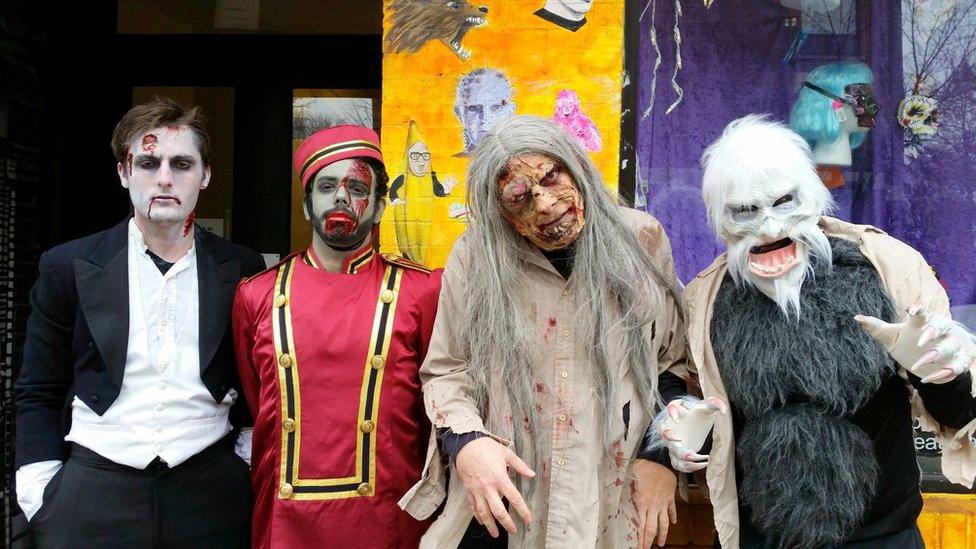
Chicago Costume says adults may take a break from Halloween this year
He says: "Parents will take kids out and people will certainly still celebrate in some form, but adults who are our main customer will undoubtedly take a break this year."
Industry-wise, Gregor Lawson, a board member of the US Halloween Costume Association, says costume makers and sellers should expect a hit this year, with fewer parties due to social distancing, and people having less money to spend.
Raining on parades
Restrictions on outdoor gatherings have hit US parades hard, most notably the largest celebration, New York City's Village Halloween Parade, which has been cancelled.
Jeanne Fleming, artistic and producing director of the not-for-profit event, says the cancellation will cause a $90m economic hole in the city. It attracts two million people to Greenwich Village to watch a mile-long parade of floats and costumes, featuring 80,000 volunteer participants.
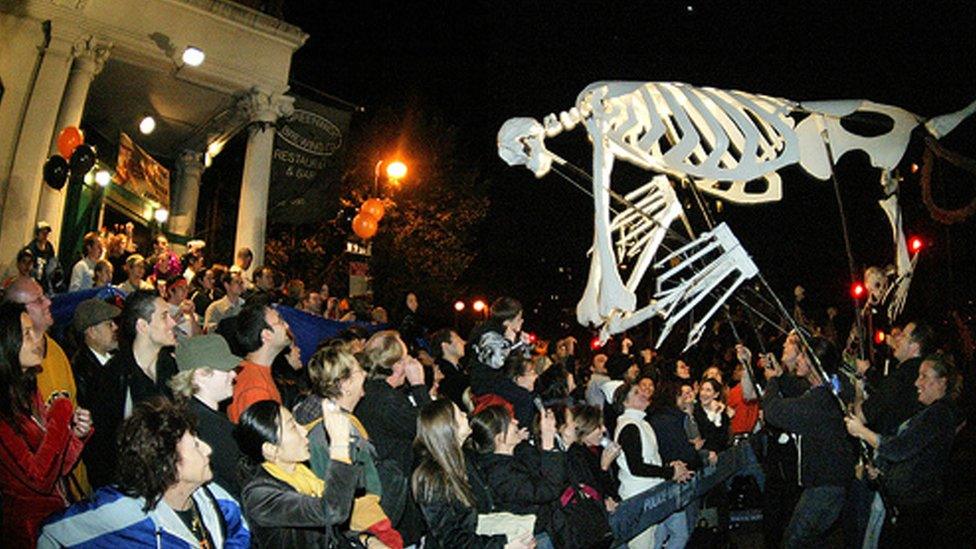
This year's event in Greenwich Village, New York City, has been postponed
"So many people have been affected by the parade not happening this year," Fleming adds, "such as dancers and actors and bands and props makers and puppeteers."
The parade has gone online with a miniature version of their festivities, where commissioned artists will each make an original 15-inch three-dimensional puppet dressed in outrageous and creative costumes. The online parade is set for 31 October.
'Struggling'
With the loss of the physical parade, many artists have felt the sting of that drop in work.
Brandon Hardy is a 29-year-old puppeteer and stage designer in New York, who worked on last year's parade.
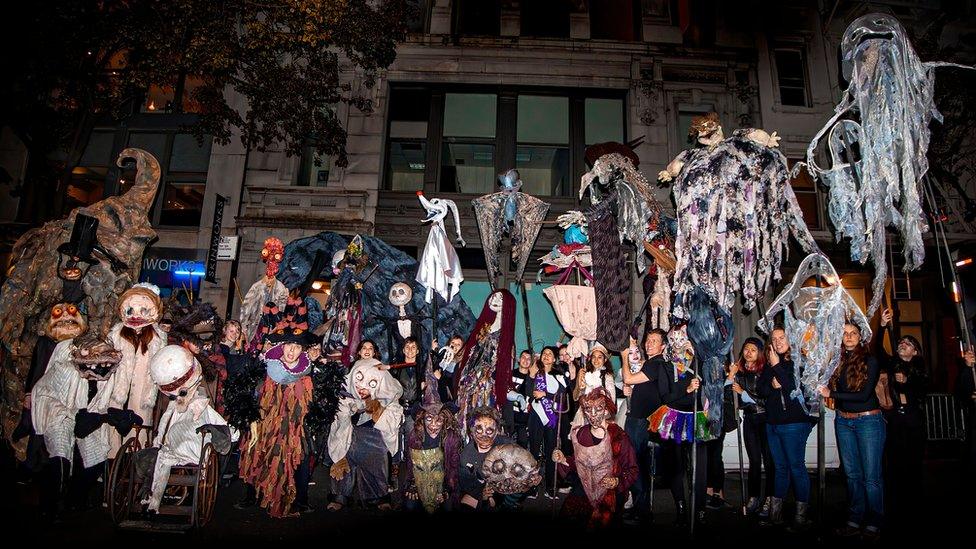
Brandon Hardy has made spectacular puppets for previous New York Halloween parades
Over the past decade, he's created puppets, props, and set pieces for more than 30 Broadway productions including Charlie and the Chocolate Factory, Disney's Frozen, The Addams Family, and Moulin Rouge.
"I'm known for making large, unusual creations for spectacular happenings but none of those happenings are happening. So I do have to admit I'm struggling to connect with an income this year," he says.
'Restrictions'
Haunted houses and attractions also suffer from lockdown-related restrictions on indoor gatherings and guidance from health officials.
Patrick Phillips, owner of Scaresville at Kentwall Hall in Suffolk, UK, was forced to cancel his haunted-house attraction that brings in 25,000 visitors annually.


New Economy is a new series exploring how businesses, trade, economies and working life are changing fast.

"Every year we rely upon Scaresville to carry us through winter, but the restrictions in place make inside events impossible," adds Phillips.
Going from £700,000 in ticket sales annually to zero will impact how well they do next year - should some normalcy return.
"Each event builds up its own momentum, and if you stop producing an event, part of your audience does something else instead and never returns," he says.
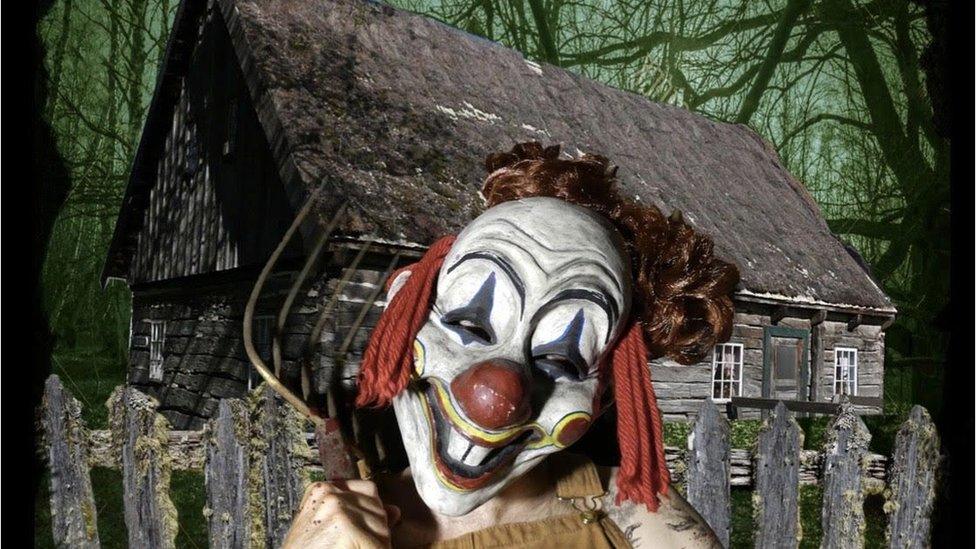
Haunt Manor in Canada is restricting the number of visitors allowed
Near Niagara Falls, Ontario, Canada, Haunt Manor is still open with its scary decor and costumed actors frightening visitors, but owner Phil Van Kleef says they had to restrict how many people could be on the 24-acre property at one time.
They also had to cancel the usual hayride and spent thousands of dollars on protective equipment and sanitiser. They have worked with Niagara Public Health on what had to be done with social distancing and limiting who can be indoors, but are now "good to go".
"Maybe a new Halloween tradition will come out of this," concludes Chicago Costume's Hickey, "where everyone decides to celebrate it safely by putting on their favourite costumes during Zoom meetings. I don't think Halloween will be cancelled outright. It'll just have to adapt."
- Published27 October 2020
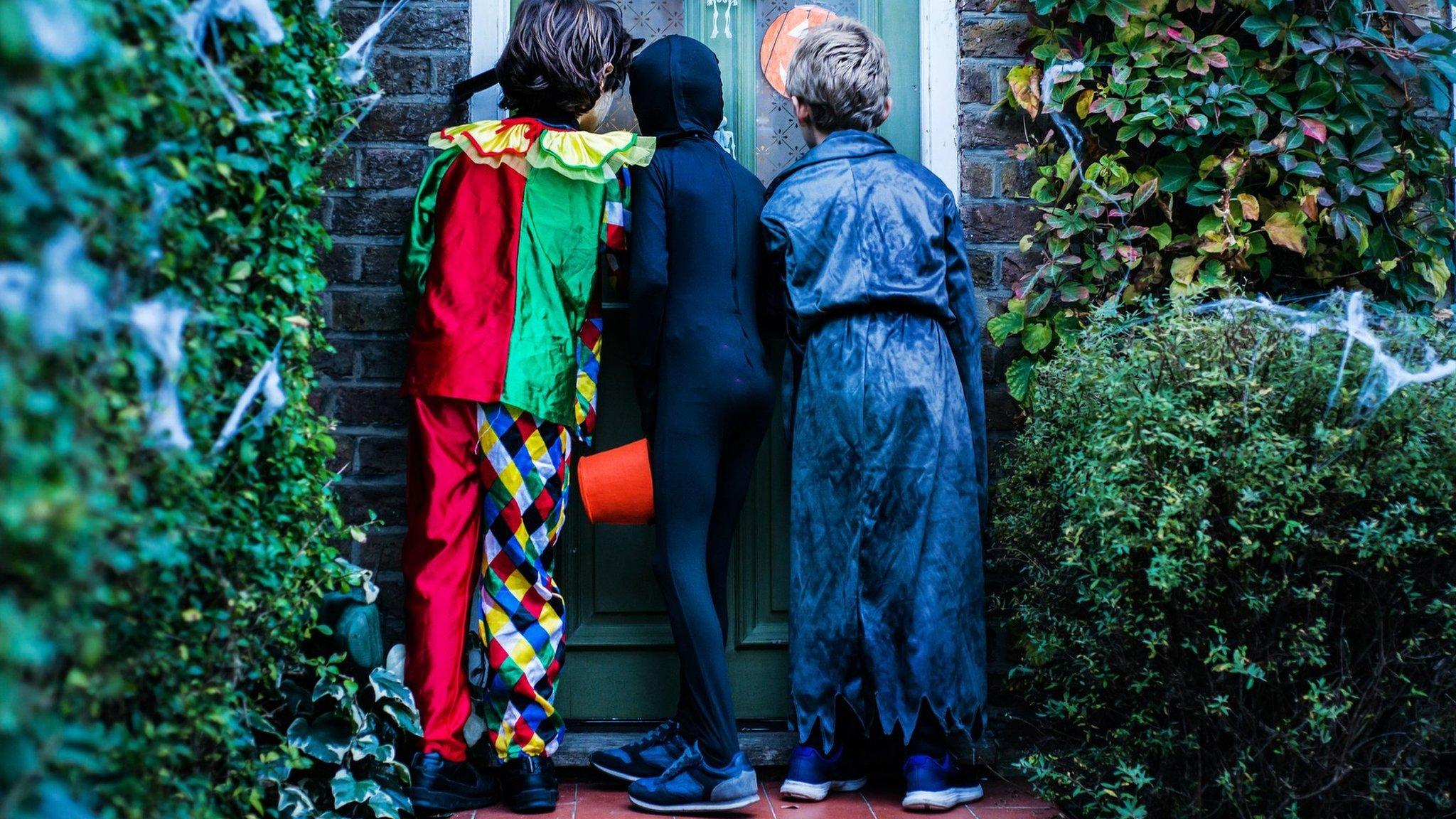
- Published25 October 2020
